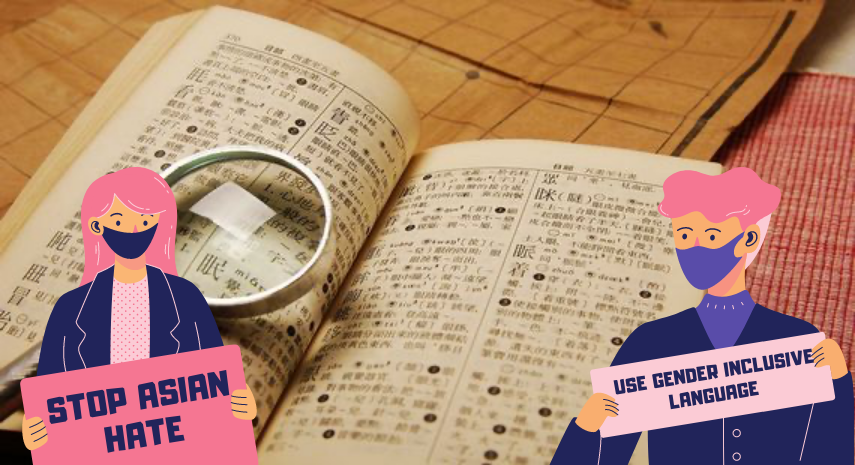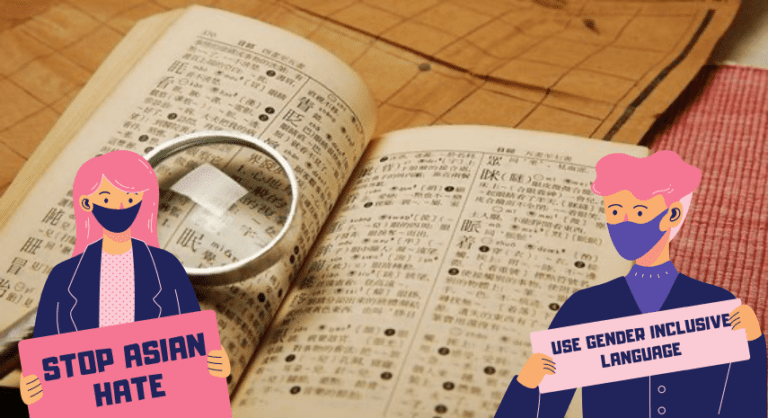 Stock image from e2f. Design by Chinosity.
Stock image from e2f. Design by Chinosity.
Chinese and AAPI communities around the world are uniting under #StopAsianHate. We are also realizing a need for greater dialogue about oppression and marginalized identities.
Language is often a barrier in conversations with family, elders, and community members. So in celebration of Chinese Language Day, we compiled a mini Mandarin Chinese dictionary of useful terms for social justice and inclusivity.
For Chinese language learners, we hope the following words fill much needed space in your vocabulary.
Words for Asian and Chinese Communities
 Collage of the Asian American community from Pew Research Center.
Collage of the Asian American community from Pew Research Center.
Person of Asian descent: 亚裔 (yà yì)
Person of Chinese descent: 华裔 (huá yì)
Asian American: 美国华裔 (měi guó huá yì)
Overseas Chinese: 海外华侨 (hái wài huá qiǎo)
- 侨 (qiǎo) is short for 侨胞 (qiáo bāo), which means “countrymen abroad”. It describes people of any culture or country living away from their home.
- 侨 (qiǎo) is pronounced the same way as 桥 “bridge. So you can remember 侨胞 (qiáo bāo) as people whose “bridge” connects back to their cultural roots.
Immigrant: 移民 (yí mín)
- 移 (yí) means “move” and 民 (mín) means people. Together, “moving people” translates to immigrant/移民 (yí mín)
Support: 支援 (zhī yuán)/支持 (zhī chí)
- Support Asian restaurants and businesses: 支援亚裔餐馆和企业 (zhī yuán yà yì cān guǎn hé qǐ yè)
Protect: 保护 (bǎo hù)
- Protect Asian elders: 保护亚裔年长者 (bǎo hù yà yì nián zhǎng zhě)
- Protect Asian sex workers: 保护亚裔性工作者 (Bǎo hù yà yì xìng gōng zuò zhě)
Grief: 悲伤 (bēi shāng)
- We grieve over the loss of Asian lives: 我们对失去的亚裔生命感到悲伤 (wǒ men duì shī qù de yà yì shēng mìng gǎn dào bēi shāng)
Unite: 团结 (tuán jié)
- We must unite to fight against racism: 我们要团结起来对抗种族歧视 (wǒmen yào tuán jié qǐ lái duì kàng zhǒng zú qí shì)
#StopAsianHate #停止仇恨亚裔 (tíng zhǐ chóu hèn yà yì)
 At a Boston University protest, sign say “#StopAsianHate!” and “警察不能保护我们,我们必须守望相助” (Jǐng chá bù néng bǎo hù wǒ men, wǒ men bì xū shǒu wàng xiāng zhù) meaning “The police can't protect us, we must watch over and help each other.” Photo by Alex Wong.
At a Boston University protest, sign say “#StopAsianHate!” and “警察不能保护我们,我们必须守望相助” (Jǐng chá bù néng bǎo hù wǒ men, wǒ men bì xū shǒu wàng xiāng zhù) meaning “The police can't protect us, we must watch over and help each other.” Photo by Alex Wong.
Hate crime: 仇恨犯罪 (chóu hèn fàn zuì)
Racism: 种族歧视 (zhǒng zú qí shì)
Sinophobia: 反华 (fǎn huá)
White supremacy: 白人至上主义 (bái rén zhì shàng zhǔ yì)
Minority: 少数族裔 (shǎo shù zú yì)
Model minority: 模范少数族裔 (mó fàn shǎo shù zú yì)
Socioeconomic status: 社会经济地位 (shè huì jīng jì dì wèi)
Gender-based violence: 性别暴力 (xìng bié bào lì)
Misogyny: 厌女症 (yàn nǚ zhèng)
Yellow Fever: 黄热病 (huáng rè bìng)
Fetishization: 恋物癖 (liàn wù pǐ)
Chinese Gender Inclusive Language
 The gender nonbinary pronoun X也 (tā) written in Chinese calligraphy. Photo by Ariana Life.
The gender nonbinary pronoun X也 (tā) written in Chinese calligraphy. Photo by Ariana Life.
Queer Chinese vocabulary is hard to pinpoint if you are not already fluent. YouDao dictionary, the most popular Chinese translation app, and Google Translate are little help.
For example, YouDao translates “gender equality” as “男女平等” (nán nǚ píng děng). This means “equal rights between men and women.” It fails to take into account the diversity of genders beyond the binary.
Instead, gender equality should be translated as 性别平等 (xìng bié píng děng). Similarly, although gender inclusive terms for “masculine” and “feminine” exist and are widely used, Google Translate does not show them.
Ironically, if you search “agender” in Google Translate, Google gives the Chinese translation as “性别” (xìng bié) or “gender.”
 Screenshot of Google Translate's translation of "agender."
Screenshot of Google Translate's translation of "agender."
In response, the following list containes accurate translations and resources on LGBTQ+ terms and gender inclusive language. Credit goes to Michelle Lin (@michellinman on Instagram) for bringing our attention to many of these terms.
As a queer Chinese Canadian writer, the following words have helped me bridge gaps in communication between myself and Mandarin-speaking family members. Further, theyt continue to open a window into global conversations on gender inclusive language.
Feminism: 女权主义 (nǚ quán zhǔ yì)
Gender: 性别 (xìng bié)
Gender equality: 性别平等 (xìng bié píng děng)
Sex/physical sex: 生理性别 (shēng lǐ xìng bié)
Gender diversity: 多元性别 (duō yuán xìng bié)
Assigned gender at birth: 指派性别/指配性别 (zhǐ pài xìng bié/zhǐ pèi xìng bié)
Transgender: 跨性别 (kuà xìng bié)
- Trans rights: 跨性别人权 (kuà xìng bié rén quán)
- 跨性别 (kuà xìng bié) is a more accurate term for transgender, which describes a gender identity different from sex assigned at birth.
- On the other hand, terms like 变性人 (biàn xìng rén), translate to “changed-gender person.” This can be misleading and harmful because being transgender is not ‘changing’ one’s gender, but presenting authentically.
Nonbinary: 非二元性别 (fēi èr yuán xìng bié)
Agender: 无性别/去性别 (wú xìng bié/qù xìng bié)
Queer: 酷儿 (kù er)
- 酷儿 (kù er) is a phonetic translation for queer. 酷 (kù) means “cool,” so it’s like saying it’s cool to be queer.
Gender queer: 性别酷儿 (xìng bié kù er)
Intersex: 间性/双性人 (jiān xìng/shuāng xìng rén)
Transition: 性别转换 (xìng bié zhuǎn huàn)
Cisgender: 顺性别 (shùn xìng bié)
Masculine: 阳刚 (yáng gāng)
Feminine: 阴柔 (yīn róu)
Androgyny: 双性性格 (shuāng xìng xìnggé)
Sexual orientation: 性取向/性倾向 (xìng qǔ xiàng/xìng qīng xiàng)
- Gay/homosexual: 同性恋者 (tóng xìng liàn)
- Bisexual: 双性恋 (Shuāng xìng liàn)
- Pansexual: 泛性恋 (fàn xìng liàn)
- Asexual: 无性恋 (wú xìng liàn)
- Aromantic: 无浪漫 (wú làng màn)
Chinese Pronouns 人称代词/代名词 (rén chēng dài cí/dài míng cí)
In spoken Mandarin, she/她 (tā) and he/他 (tā) share the same pronunciation as Chinese does not have a gender neutral third-person pronoun.
However, Chinese transgender and nonbinary communities are discussing gender neutral pronouns like the nonbinary X也. The terme was created by an intersex information platform called The Missing Gender 0.972, or the informal 佢 (qú).
For the most part, the pinyin “ta” is used in written contexts where a person’s gender remains unknown or irrelevant. T has been widely embraced and can be seen on Weibo posts like this one!
 The news station uses the gender inclusive and gender non-assuming TA in announcing their Children’s Day fundraiser. “儿童节你想对TA说_____?” translates to “what do you want to say to them on Children’s Day?”
The news station uses the gender inclusive and gender non-assuming TA in announcing their Children’s Day fundraiser. “儿童节你想对TA说_____?” translates to “what do you want to say to them on Children’s Day?”
Happy International Chinese Language Day!
Chinese Language Day is about celebrating multilingualism and cultural diversity. The above terms help us advocate for a better, safer, more inclusive world.
We hope this mini dictionary helps you stand up against Asian hate, connect with people around you, start conversations, and find ways to express yourself.



0 Comments